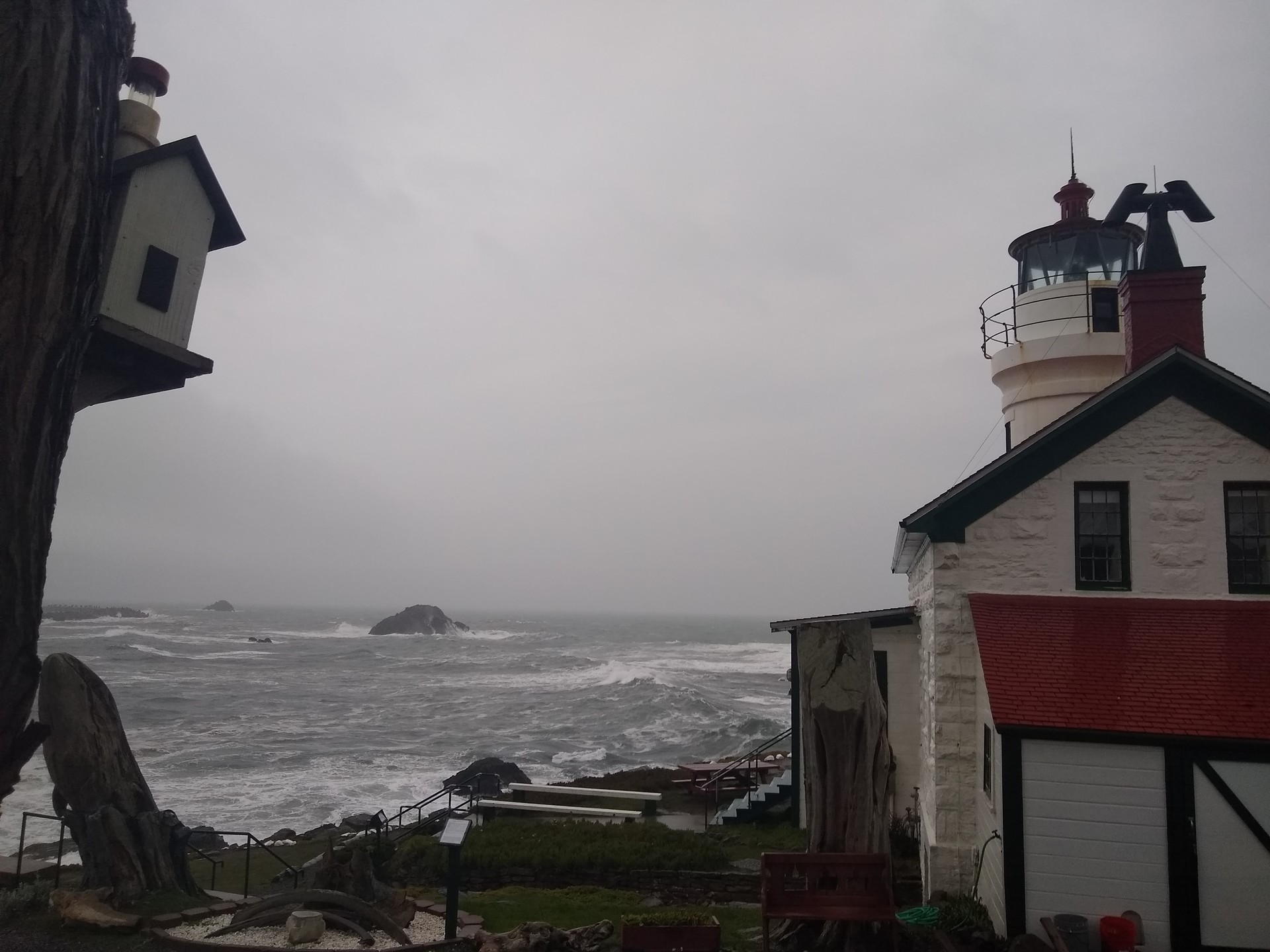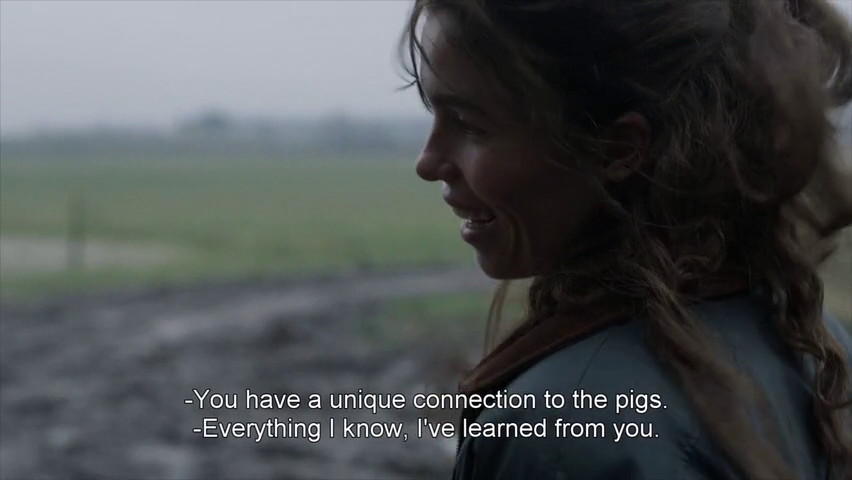I’m listening to a cantankerous artist say that her work isn’t about anything, it’s only itself, and I’m driving on a highway winding in tandem with a river that figured in someone else’s dream that I have discussed at length with a friend and that, flood-full of mud and flotsam, like a shrimp vein, will disperse into the Pacific Ocean. The dream became an object of consideration by singling out one person and by the exclusion of other dreams–either forgotten, never recounted to me, or never recounted by me to someone else. The river is about something to me, but its rapids and eddies are hypnotic, drawing me in like the singularity of a nonmetaphoric work of art.
The artist is talking of her work as a capsule for her feelings, which she leaves behind in the work. Having not worked on anything, the house I’ve just left continues to disorient me. It still seems to be in the present tense.
I arrive to cooked, cleaned, split crabs. Their bodies are made up of many chambers of meat. I crack open a chamber, pick out and eat its meat, open the next chamber, etc. Before becoming acquainted or reacquainted with a group of people, everything they say is about something that they’re not aware of. I’m envious of people who can tell a story, but sometimes all I really want is to overhear a story in another room, so that I don’t have to have fidelity to its intended meaning. “Is this the one that you’re supposed to make yourself tall to? Or the one you’re supposed to run away from? Or the one you’re supposed to make loud noises at?” I overhear this, about an encounter with an animal of a species I didn’t catch, before I sit down with two half-strangers who are looking at their phones. Not knowing what to say, I give my attention to the dogs.
“When the 9.2 hits you won’t be able to move, everything’ll be shaking so hard you’ll be pinned to the floor. You’re gonna want to drive to high ground, because an earthquake like that’s going to create 100-foot tsunami waves.”
“How am I supposed to drive to high ground when I won’t be able to move?”
“After the quake ends. The waves won’t come immediately. You’ll have a while to get in your car and drive.”
Some of us go swimming, or rather, one of us goes swimming, and the other three watch the waves raised by the storm. From the lighthouse I see the swimmer stand hesitantly ankle-deep in the surf. We hear the foghorn, and one of us questions the information he heard about foghorns, that they sound every ten seconds. “That’s not ten seconds,” he says, counting, and then, at the end of his count, concedes that it is in fact ten seconds. Wielding cluelessness like criticality, we wonder what exactly the foghorn is supposed to do. It seems to us to be an alarm that fails to convey any useful information other than what would be obvious to anyone in the fog: that it is foggy. We wonder if mariners are or were capable of estimating how far away and in what direction they were from the horn, meaning from dangerous rocks. When we come down from the lighthouse, the swimmer is completely soaked, though due to the rain we don’t look much different. She describes what she did while I wasn’t looking: walked out until the swells were waist-high, and crouched to submerge herself entirely. It seemed too dangerous, she says, to go out any further. We all emphatically agree, having watched the waves pummel the rocks. She says that one of the reasons she wants to start a group of women who swim every morning is that she’s afraid she won’t be able to resist the desire to go swimming when she’s drunk one night. “I feel so good” she repeats for the next hour.
The next day passes quickly. I write a note to myself that I feel “as if battered by waves of company, I forget what my set of metaphors, train of thought, container for material was.” The one who got drunk the previous day to the point of becoming a communal story of extreme drunkenness asks us what he said while he was drunk. “You were really incoherent,” his friend says, and he asks how. I recount what this friend told me at the time. She said he went outside and she went looking for him, calling his name. She saw his silhouette in the rain. “I just want to stand outside in the rain, drink my wine, and pee,” I tell them I remember her saying he said. She adds that she was glad they live in a quiet town, so that she didn’t have to worry about him getting hit by traffic. He wants more examples of his incoherence. I tell him that trying to remember incoherence is like trying to remember a dream. All I can remember is what’s already been rendered into a coherent story.
She tells us she wants to start a Twitter account with the name “word compost,” a term she attributes to me, where she would post “things that nobody in the history of the world has ever said before.” What it sounds like she means is a kind of non-multiple-choice Cards Against Humanity: all the utterances that, taken out of context, sound absurdly offensive or offensively absurd. I don’t see the point in being pedantic, and it seems too complicated of a story to say what I had really called “word compost” the previous day: Her friend had asked her “is that french toast on your pajamas?” No, it was a monkey, but I said I had thought that French Toast was the name of the cartoon monkey depicted on her pajamas, a character I was unfamiliar with, but that I assumed the two of them knew from childhood. As an in-joke, she continued to refer to the monkey on her pajamas as French Toast, and I said that the name was a kind of word compost. This bad term for the amusing result of a misunderstanding then became repurposed, like the name French Toast, to name an aesthetic of repurposing.
The house was once owned by a hoarder, and this renewed house came to be through the removal of all of his crap. His children wanted nothing to do with it. The only things these new inhabitants kept were stacked above the wood stove: Politically offensive books that they wanted the satisfaction of burning rather than giving away. In dispersing and destroying his archive, they became the flaky repositories of his boring story.
Sitting on the couch in this emptied-out house, I read in Shiv Kotecha’s The Split:
close your eyes and squeal up at me in a fit of anguish Shiva made me and Shiva will waste my gardens and my wives and Shiva is going to destroy me and all of the tiny fire I can make. You repeat it over and over.
We begin watching a documentary about a number of idiots who were lured by another idiot (who among us isn’t an idiot?) to an island that was not an island but was nonetheless on an island, and rather than partying, ended up surviving a storm in tents. “It’s really coming down,” one of us says, “the air is basically water at this point.” She mimes swimming, bulging out her cheeks to show that she’s holding her breath. We all laugh at the image, looking out the window at the image of the small pond that the back yard has become. Galoshes have become something that people borrow, fit becoming less important than water proofing. Someone introduced as as a writer appears to give us the second metaphor of the documentary, and one of us says, mockingly, “she likes metaphors.” A second points out that the writer is a writer, and writers like metaphors. A third manages not to say petulantly “is there anything that’s not a metaphor?”
My friend talks about making a documentary about the deer in the town I live in, or about the town’s troubled and histrionic relationship with the deer. There’s a fine for feeding the deer, and she points out that the deer population is way beyond the point that preventing a few people from feeding them is going to help. I had a neighbor who defiantly fed and left out bowls of water for the deer, and she wants to interview her, but my neighbor moved away long ago. She would also like to interview people whose pets have been attacked by deer, a phenomenon she finds irresistibly funny, if horrible. I vent about the various forms of masculinist “solutions” that bubble up in polite conversation, genocidal fantasies of, for example, people roaming the streets with bows and arrows, culling the excess deer once and for all. She’s sympathetic with what I’ve called fantasies. With annoyance I note to myself how quickly she moves to prescription, but also note that my descriptions are full of prescriptions for prescriptions, albeit only one: not this. The humor of the town’s deer situation to me is that it’s unavoidable, that despite tracking tags, endless discussions, violent urges, and ecological knowledge of the causes, deer will continue to be first world problem extraordinaire by crashing through storefronts, mauling and sometimes killing pets, and eating gardens. “Can the documentary propose a solution?” asks her friend.
This friend brings home a large houseplant that needs to be repotted. The tree is rootbound in its plastic pot, and the two of us try to pull it free. I hold onto the pot, and she pulls on the tree. As we struggle to get it out, the dog growls and goes for my neck. “What the hell?” I say, and push him away with my arm, and she scolds him. “Are you okay?” she asks, and I say, touching my neck, “yeah, I’m fine.” She switches to a more sensible method, using a knife to cut the pot away. I begin to notice an unidentified sensation in my neck, like it’s blooming. It dawns on me the dog must’ve bit me. I ask her something about my neck, and she tells me, laughing nervously, that the dog drew blood. We rehash what happened a few times over the rest of the day, and can’t understand what the dog reacted to. We joke that he was protecting her from what appeared to him to be something violent I was doing to her, but we can’t really understand how being on two ends of a potted tree looked like that to him. His owner hypothesizes that he realized his mistake, because he gave up so quickly, and appears–she admits she may be projecting–guilty. I joke that I find myself giving him more affection since he has attacked me, and ask what this says about me. I keep saying “it could’ve been way worse,” and they keep parroting my words back in a way that sounds knowing. I feel like I’m missing something about what they’re saying, but possibly what I’m missing is that they, just like me, are missing something about what I’m saying.

